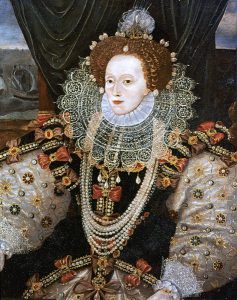 Answer: The background of the Elizabethan socio-political life includes two great movements—”The Reformation” and “the Renaissance” The Reformation movement began completed before the Renaissance. It began during the reign of Henry VIII, the father of Queen Elizabeth I and the king of England. His reign ended in 1647. In fact, the entire period was a period of religious movement in the English religio-political life. The national focus was on the liberation of the Church of England from the authority of the Roman church. This liberation movement is known as the Reformation. This is also known as the Protestant Revolution because it could establish the Reformation Church or Protestant Church, making a complete break with Roman Church. This movement was greatly influenced by a German leader—Martin Luther and spread all over Europe, leading to the establishment of Protestant Church.
Answer: The background of the Elizabethan socio-political life includes two great movements—”The Reformation” and “the Renaissance” The Reformation movement began completed before the Renaissance. It began during the reign of Henry VIII, the father of Queen Elizabeth I and the king of England. His reign ended in 1647. In fact, the entire period was a period of religious movement in the English religio-political life. The national focus was on the liberation of the Church of England from the authority of the Roman church. This liberation movement is known as the Reformation. This is also known as the Protestant Revolution because it could establish the Reformation Church or Protestant Church, making a complete break with Roman Church. This movement was greatly influenced by a German leader—Martin Luther and spread all over Europe, leading to the establishment of Protestant Church.
In England, the Reformation movement and the Renaissance came together. The Reformation had its impact on Renaissance literature. In fact, the literary and cultural history of Renaissance will not be understood without a reference to the Reformation and its influence on it. We may in this connection refer to such authors as Marlowe, Spenser, and Shakespeare even to Milton. Milton alone represents the Puritan role and its interest in the history of religious evolution against the Church of Rome. In fact, Protestantism is a humane interpretation of Catholic religion. It is a modern attitude to Christian religion. There is another important event to note is the translation of the Bible—The Old Testament and The New Testament and its publication in 1611. This version is known as the authorized version of King James. In this regard, forty three scholars were appointed by the king. The facility was thus created for the Bible to be read by all classes of people and by the writers of different branches of literature. Numerous writers made a reference to the Bible. In other words, in the cultural revival of the Renaissance, the Bible added a special dimension. Therefore, the authorized version of the Bible contributed to the national life of Renaissance and Reformation of Europe. For an example, we can say the spiritual conflict in Doctor Faustus’ soul was historically a conflict in the soul of Renaissance England. This was produced by the forces of Renaissance and Reformation coming together.
[adToAppearHere
During the Elizabethan era, the Renaissance had made a massive contribution to art, culture and literature. Renaissance was a revival in the study of Greek which brought light into many dark places of the intellect. The new passion for classical learning in itself became a rich and worthy enthusiasm. In all branches of literature Greek and Latin ideas began to force themselves upon English. The new romanticism of the Elizabethan age is for the remote, the wonderful and the beautiful. This is why Elizabethan age is the first and greatest romantic age. There was an adventure in literary field. It was the ardent youth of English literature and the achievement was worthy of it.
In Drama, there has been massive progress. There arrived hosts of dramatist including Shakespeare. In spite of some early difficulties, drama reached its climax in the hand of Shakespeare. Although the poetical production was nto quite equal to the dramatic, it was nevertheless of great and original beauty and prose for the first time also rises to a position of first rate importance. The Latin tradition passed away and English prose acquired a tradition and a universal application. There was a minor feature of the age and it was the disappearance of Scottish literature which was brief but remarkable in the previous age.
It is to be noted that Elizabethan literature was born under the influence of Renaissance or humanism. The Elizabethan age is called the first and greatest epoch in English literature, the romantic quest of this age is for the remote, the wonderful and the beautiful. Love for beauty, sensuousness, imagination etc. constitute the romantic temper of the Elizabethan period. For these reasons Elizabethan period is rightly called the first romantic age in English literature. In the Elizabethan age, England challenged the modern and ancient writers in various fields of literature – drama, epic, pastoral, lyric, romance, allegory, history and philosophy. It is as if the whole nation became a nest of birds. As a result there burst out the spring time of English literature. A host of writers with Shakespeare on their top came and pushed back the old English literature to the first place in the European Literature.




